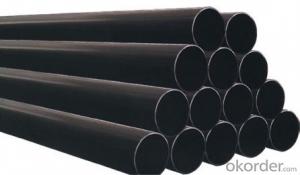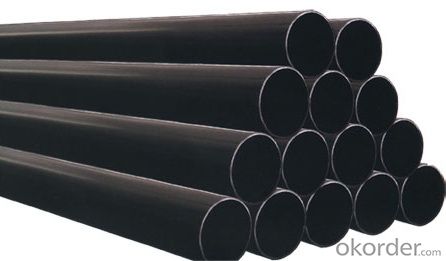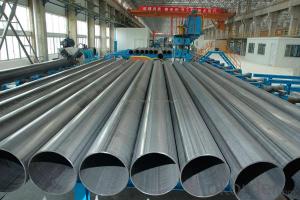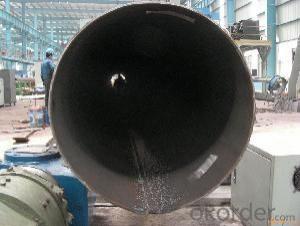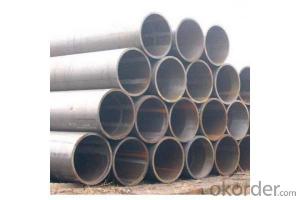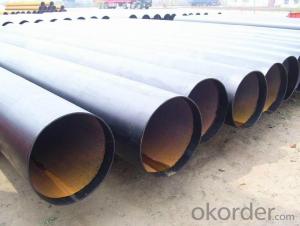LSAW SSAW CARBON STEEL PIPE ASTM API 16/18/20/26/28
- Loading Port:
- Tianjin
- Payment Terms:
- TT OR LC
- Min Order Qty:
- 1 m.t.
- Supply Capability:
- 3000 m.t./month
OKorder Service Pledge
OKorder Financial Service
You Might Also Like
Packaging & Delivery
Packaging Detail: | Normal exporting packing,in container or bulk vessel or as per clients' request |
Delivery Detail: | 2 months after confimed contract |
Specifications
Large Diameter API 5L X70 PSL2 LSAW Steel Pipe
Grade: X42, X46, X50, X52, X60, B, C
OD: 1.5"-28"
WT: SCH10-SCH160
Large Diameter API 5L X70 PSL2 LSAW Steel Pipe
Specifications:
u Standard: API 5L
u Grade: B, C, X42, X46, X50, X52, X56, X60, X65, X70, X80
u OD: 1.5"-28"
u WT: SCH10-SCH160
u Length: 5-12m
u Ends Finish: plain end, bevel end, grooved end
u Surface Treatment: bare, black varnished, oiled finish, red color, anti-corrosion, 3PE, FBE or epoxy coating
u Technique: hot rolled or cold drawn
u Application: api 5l steel pipe for conveying oil, water, gas
u Invoicing: based on theoretical weight or actual weight
u Payment Terms: L/C at sight, T/T or Western Union
u Trade Terms: FOB, CFR, CIF
u Certification: ABS manufacturing assessment, ABS design assessment, API 5CT, API 5L, DNV manufacturer certificate, ISO9001 quality management system certificate, ISO14001 environment management system certificate, GB/T28001 occupational health and safety management system certificate, A1 class manufacturing license of special equipment certificate, CCS, GL, LR, SGS, TüV, PDE
- Q: How are steel pipes used in the agricultural sector?
- Steel pipes are commonly used in the agricultural sector for various purposes such as irrigation systems, drainage systems, and construction of structures like greenhouses and barns. They are durable, strong, and can withstand harsh weather conditions, making them ideal for these applications in the agricultural industry.
- Q: How are steel pipes used in water transportation?
- Steel pipes are commonly used in water transportation systems as they are strong and durable, allowing for the safe and efficient delivery of water. These pipes are used to create networks that transport water from sources like reservoirs or treatment plants to homes, businesses, and other areas where water is needed. Steel pipes offer excellent corrosion resistance, ensuring the water remains clean and uncontaminated during transport. Additionally, their seamless construction minimizes leakage and ensures a consistent flow of water, making them an ideal choice for water transportation infrastructure.
- Q: Can steel pipes be used for underground water supply?
- Yes, steel pipes can be used for underground water supply. Steel pipes are strong, durable, and resistant to corrosion, making them suitable for various applications, including underground water supply. However, it is important to use steel pipes that are specifically designed for underground use and are coated or lined to prevent corrosion. Additionally, proper installation and maintenance are crucial to ensure the long-term integrity and functionality of the steel pipes in an underground water supply system.
- Q: How are steel pipes tested for leakage?
- Steel pipes are typically tested for leakage using various methods such as hydrostatic testing, ultrasonic testing, or dye penetrant testing. Hydrostatic testing involves pressurizing the pipe with water or another suitable liquid to a predetermined level and checking for any pressure drop over a specific period of time, indicating potential leakage. Ultrasonic testing utilizes high-frequency sound waves to detect any defects or cracks in the pipe wall that may cause leakage. Dye penetrant testing involves applying a colored liquid to the surface of the pipe, which seeps into any cracks or openings, making them easily visible under specific lighting, thus identifying potential leaks.
- Q: What is the role of steel pipes in sewage systems?
- Steel pipes are commonly used in sewage systems as they provide durability, strength, and resistance to corrosion. They serve the crucial role of transporting wastewater, sewage, and other fluids from buildings to treatment facilities or disposal sites. Steel pipes are able to withstand the high pressure and gravity flow of sewage, ensuring the safe and efficient conveyance of waste materials.
- Q: How are steel pipes used in railway infrastructure?
- Steel pipes are used in railway infrastructure for various purposes such as constructing bridges, tunnels, and track supports. They are also used for drainage systems, signaling and telecommunication cables, and as conduits for electrical wiring.
- Q: Can steel pipes be used for underground water treatment systems?
- Yes, steel pipes can be used for underground water treatment systems. Steel pipes are known for their durability, strength, and resistance to corrosion, making them suitable for various applications, including underground water treatment systems. They can withstand the pressure and environmental conditions found underground, ensuring the safe and efficient transport of water within the treatment system. However, it is important to consider the water quality and potential for corrosion in the specific location when selecting the type of steel and implementing protective measures, such as coatings or cathodic protection, to prevent corrosion and ensure the longevity of the pipes.
- Q: How are steel pipes repaired if they are damaged?
- Steel pipes can be repaired if they are damaged by various methods such as welding, pipe lining, or using repair clamps. The chosen repair method depends on the extent and type of damage to the pipe.
- Q: Can steel pipes be used for irrigation pumps?
- Yes, steel pipes can be used for irrigation pumps. Steel pipes are commonly used in irrigation systems due to their durability, strength, and resistance to corrosion. They can handle the high pressures and flow rates required for efficient irrigation, making them a suitable choice for connecting and transporting water from irrigation pumps.
- Q: How are steel pipes inspected for quality?
- Steel pipes are inspected for quality through a rigorous process that involves various techniques and standards. One common method is visual inspection, where trained professionals examine the pipes for any visible defects such as cracks, dents, or surface irregularities. This visual inspection ensures that the pipes meet the required specifications and are free from any visible flaws. Additionally, non-destructive testing (NDT) methods are employed to evaluate the internal and external quality of the steel pipes. One widely used NDT technique is ultrasonic testing, which involves sending ultrasonic waves through the pipes to detect any internal defects or inconsistencies in the material. This method can identify issues like wall thickness variations, inclusions, or weld defects that may compromise the pipe's integrity. Another popular NDT technique is magnetic particle inspection, which uses magnetic fields and iron particles to identify surface cracks or flaws in the steel pipes. This method is particularly effective for detecting defects in ferromagnetic materials and can be performed on both the outside and inside surfaces of the pipes. Furthermore, hydrostatic testing is often conducted to evaluate the pipes' strength and resistance to pressure. In this process, the pipes are filled with water or another suitable fluid and subjected to a specified pressure to check for leaks or structural weaknesses. This test helps ensure that the pipes are capable of withstanding the intended operational conditions without failure. In addition to these techniques, various quality control measures are implemented throughout the manufacturing process, including material traceability, dimensional checks, and chemical composition analysis. These measures help guarantee that the steel pipes meet the required standards and specifications, ensuring their quality and reliability. Overall, the inspection of steel pipes for quality involves a combination of visual inspection, non-destructive testing methods, and quality control measures. These comprehensive procedures help identify any defects, inconsistencies, or weaknesses, ensuring that the pipes meet the necessary quality standards and are fit for their intended purpose.
Send your message to us
LSAW SSAW CARBON STEEL PIPE ASTM API 16/18/20/26/28
- Loading Port:
- Tianjin
- Payment Terms:
- TT OR LC
- Min Order Qty:
- 1 m.t.
- Supply Capability:
- 3000 m.t./month
OKorder Service Pledge
OKorder Financial Service
Similar products
Hot products
Hot Searches
Related keywords
